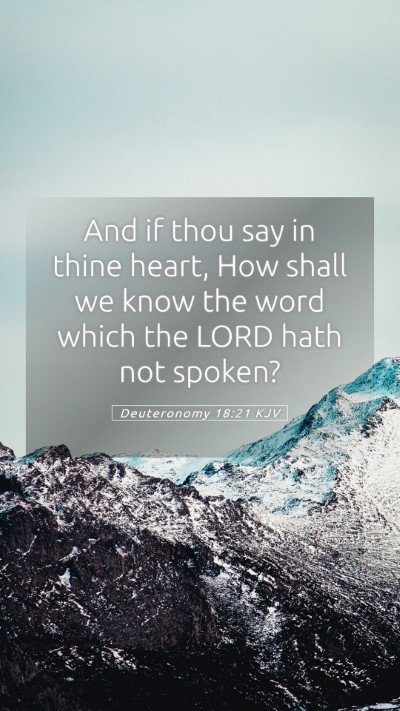Bible Verse Commentary on Deuteronomy 18:21
Verse Text: "And if you say in your heart, ‘How shall we know the word which the LORD has not spoken?’"
Deuteronomy 18:21 poses an important question regarding the discernment of true prophecy versus false prophecy. This inquiry serves as a central theme in understanding prophetic messages and the authenticity of those who claim to speak on behalf of God.
Meaning and Insights from Public Domain Commentaries
This verse encourages believers to seek a deeper understanding of God's messages. Below, we explore insights drawn from renowned biblical commentaries, which provide clarity to this verse's interpretation.
Matthew Henry's Commentary
Matthew Henry emphasizes that this verse reflects the necessity of discernment among the people of Israel regarding the prophets. He explains that not every voice claiming to represent God is legitimate; thus, the question of how one can distinguish God’s words from man's words is crucial. Believers must rely on signs and the faithfulness of the prophet's message.
Albert Barnes' Notes on the Bible
Barnes extends this idea by suggesting that this inquiry arises from a cautious heart; individuals genuinely seek to know how they can determine the authenticity of a prophetic word. He reminds readers that true prophets from God should present timely and fulfilled messages that align with God's established promises and His revealed word.
Adam Clarke's Commentary
Clarke highlights the challenge of recognizing true prophets through the lens of history. He reasons that God has given clear guidelines concerning prophets’ signs, emphasizing the importance of divine confirmation in their proclamations. He further asserts that when examining prophecies, one should consider the nature of the message and its alignment with prior revelation.
Key Themes in Deuteronomy 18:21
- Discernment: A call for believers to be discerning about the messages they receive.
- Prophetic Authenticity: Assurance that prophecies must match God's truth and character.
- Faithfulness of God: Reflection on how God will reveal His words through true prophets.
- Historical Context: Understanding the backdrop of prophetic messages in Israel's history.
Applying the Verse to Daily Life
This verse holds practical significance for modern believers who are encouraged to filter messages through biblical truth. When encountering various teachings or spiritual leaders, it is crucial to ask:
- Do these teachings align with Scripture?
- What evidence supports their claims?
- Is their message consistent with the character and purposes of God?
Related Bible Cross References
- Jeremiah 14:14 - Discusses false prophets and the need for discernment.
- Matthew 7:15 - Advises to beware of false prophets.
- 1 John 4:1 - Encourages testing spirits to see if they are from God.
- Acts 17:11 - Commends those who examine the Scriptures daily.
Conclusion
Deuteronomy 18:21 invites believers to cultivate a discerning spirit and provides a framework for understanding biblical prophecy. By studying this verse and engaging with history and theology, one can gain valuable Bible study insights into how to apply these principles in an ever-changing spiritual landscape.
Whether in personal study, Bible study groups, or online Bible studies, the techniques for understanding Scripture and the significance of each verse can inform and guide one's journey of faith.
Keywords: Bible verse meanings, Bible verse interpretations, Bible verse understanding, Bible verse explanations, Bible verse commentary, scripture analysis, biblical exegesis, Bible study insights.


